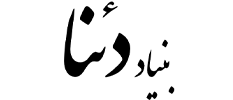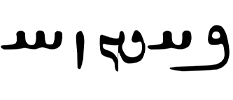ĀfS: āfrīn ī sūr | A Banquet Speech
Rshsm Asha
This is a benediction pronounced in the sūr “where excellent food was served and where cooks and table boys, singers and musicians, and gate-keepers were engaged.” The text is also an example of after-meal speech at banquets and at anniversary ceremonies (different from death anniversary), the rōzgār. The text as reached us dates back to the Sasanian era; and a list of Persian dignitaries in it shows that it belongs to the sixth century, or as Jehangir Tavadia states: “We have found only the upper limit, namely the reign of Husrav I.” It is called with different headings by different scholars.
pārsīg
ped nām ī yazdān
(1) āzādīh ī yazdān ud vehān andar harv gāh ud zamān guftan ud hangārdan sazāgvār, ped nāmcišt andar rōzgār-ē ī ped ēn ēvēnag.
(2) gōš andar dāred ašmā vehān ī ēdar mad ēsted, dā abar stāyēnīdārīh ī ēn sūr, āfrīn az yazdān, ud spāsdārīh ī ēn myazdbān soxan gōbam!
[hamāgzōr]
(3) hamāgzōr bavēd, hamāgzōr Ohrmazd ī xvadāy kē ped mēnōgān ud gētīgān mahist, kē hamāg ēn dām ud dahišn dād, pediš pānag ud dāštār būd ēsted.
(4) hamāgzōr ēn haft amehrspend ī ped garōdmān hend: Ohrmazd ud Vahman ud Urdvahišt ud Šahrever ud Spendarmed ud Hurdād ud Amurdād.
(5) hamāgzōr ēn haft vahišt kē ped gerbālāy ēk, ped midrag pāyag do, ped star pāyag si, ped māh pāyag cahār, ped xvaršēd pāyag panz, ped harburz pāyag šaš, haft ped rōšn garōdmān ī vasrōšnīh ī huzihr ī brāzāgdum ī purr-anōš ī purr-nēkīh, kū pēšgāh ī Ohrmazd ī xvadāy, ī xvad ped mēnōgān xvadāyīh, kē ēn haft amehrspend.
hamāgzōr ēn haft kišvar: Arzah ud Savah ud Fradadafš ud Vīdadafš ud Vorubaršt ud Vorujaršt, ud kē ped meyān, Xvanirah ī bāmīg ī vashambār ī purr-mardōm ī purr-nēkīh.
(6) hamāgzōr ādur Farrōbay ud ādur Gušnasp ud ādur Burzēnmihr, ud abārīg ādurān ud ātašān ī ped dādgāh nišāst ēstend, cand ahīdar hamēšagsōz ud hamēšagpih ud hamēšagzōhr bavānd.
(7) hamāgzōr Mihr ī frāxgōyōd, ud Srōš ī tagīg, ud Rašn ī ristag, ud Varhrām ī amāvand, ud Vāy ī veh, ud veh dēn ī mazdesnān, ud Aštād ī frādādār-gēhān, ud fravahr ī ahlavān.
(8) hamāgzōr hamāg mēnōg ī meh ud veh kē ped sīh-rōzagīhā pēdāgēnīd ēsted.
(9) hamāgzōr šāhān šāh ī mardān pahlum.
(10) hamāgzōr pus ī vāspuhr ī šāhān, farroxdum ī dāmān, pahlum ī andar gēhān abāyišnīgdum.
(11) hamāgzōr vazurg framadār kē ped vazurgīh vazurg, ud ped pādixšāyīh pādixšāy, ud pez dahišnān meh ud veh.
(12) hamāgzōr Xvarāsān spāhbed; hamāgzōr Xvarōfrān spāhbed; hamāgzōr Nēmrōz spāhbed; hamāgzōr Ādurbāyagān spāhbed.
(13) hamāgzōr šahrdādvarān.
(14) hamāgzōr muvān handarzbed; hamāgzōr hazārbed.
(15) hamāgzōr meh ud veh kē-šān ped ēn myazd arzānīg kird.
[āfrīn]
dahād zūd ped xvadāyīh ī Ērānšahr abrang ped meyān, bavād cōn ped xvadāyīh ī Jim ī šēd ī huramag ī rōzgār farroxīhā ud xvašīhā rāyēnīd!
vehān ēk hazār pedīrād, ud āfrīn ped im mērag ī mīzdbān kunād!
(16) ped nāmcišt āfrīn ēn kunād kū:
abāg mardōmān ī xvad tandrust ud dagrzīvišn ud xvāstag ped abzōn ēdōn bavād cōn az abestāg pēdāg:
(17) “ka-mān nēk stāyend, hāmōyēn gētīg xvaštar.”
ud hamvār āfrīn ped ēn mān kunād kū: vas bavād ped ēn mān vas asp ī ray, zan ud mard ī šāyendag ī hanzamanīg, guftār abāg yazdānāyād, vaszarr abāg-asēm, vasjav abāg-gannum, vashambār ī purr-nēkīh ud huram ud huniyāg!
bavād nēk zamān ud nēk sāl ud nēk māh ud nēk rōz, ud nēkīh az ēn mīzdbān rāy vas nēktar!
[spās]
(18) spās ī Ohrmazd; spās ī amehrspendān.
spās āsrōnān, ud spās arsēštārān, ud spās vāstryōšān, ud spās hudoxšān.
spās ātašān ī ped gēhān.
spās xvāngarān, ud spās huniyākkarān, ud spās darbānān ī ped dar.
spās ēn mīzdbān kē ēn rōzgār handāxt ud sāxt, kird ud rāyēnīd. nēk-amān pih, ud stabr-mān sūr, ud pahlum-amān hamrasišnīh;
ud stāyišnīg, menišnīg, gōbišnīg ud kunišnīg spāsdār, ī azabar spāsdārīh anī tis nēst.
(19) bē, man soxan vēš abāyed guftan pēš ašmā vehān, kū sagr ham az xvarišn, ud purr ham az may, ud huram ham az rāmišn.
bē, ašmāh vehān, stāyišn ī yazdān ud āfrīn ī vehān bavandag guftan nē šāyam! ašmā vehān ī ēdar mad ēsted, harv cē vehdar dāned, guft gōbed!
(20) cē an harv cē frahangīgdar; cē man xrad nihang, ud may abēr xvārd ēsted.
xvaš xvafsed, ud yazdān ped xvamn vēned! ud drust āxēzed, ud ped kār ud kirbag kirdan toxšāg baved! ka az bun dahišn dā frazāmgārīh ōy farroxīhādar kē yazdān ōy ped frārōnīh ud toxšāgīh arzānīg dāred.
(21) āfrīn, cōn-um guft, bē rasād, zamīg-pahnāy, ud rōd-drahnāy, ud xvaršēd-bālāy bē rasād! ēdōn bād! ēdōndar bād!
frazaft ped drūd, šādīh ud rāmišn ī harv vehān frārōnkunišnān!
English
In the name of Gods
(1) It is befitting to speak and give thanks to the Yazata and the good, at every watch and time, especially on a day (of anniversary) like this.
(2) Be all ears, you good ones who have come here, so that I pronounce a speech in praise of this banquet, for blessings from the Yazata, and in gratitude towards this host!
[hamāgzōr]
(3) May you be hamāgzōr: hamāgzōr (with) the lord Ahura Mazdā, who is the greatest among those of the world of thought and those of the world of life, who created all these creatures and creations, (and) has been the protector and preserver thereof.
(4) Hamāgzōr (with) these seven Holy Immortals (the Amǝṣa Spǝṇta) who are in the House of Song (Garō.nmāna): Ahura Mazdā, Vohu Manah, Aṣa Vahišta, Xšaθra Vairya, Spǝṇtā Ārmaiti, Haurvatāt, Amǝrǝtatāt.
(5) Hamāgzōr (with) these seven heavens, which are: one at the top of a mountain; two at the cloud station; three at the star station; four at the moon station; five at the sun station; six at the Harā Bǝrǝzaitī station; seven at the bright Garō.nmāna, which is very bright, which is beautiful, which is most shining, which has much nectar, which has much goodness, which is the (royal) court of Ahura Mazdā the lord who himself rules over the celestial (spiritual) beings, who are these Holy Immortals.
<Hamāgzōr with these seven continents:> Arǝzahi, Savahi, Fradaδafšu, Vidaδafšu, Vouru.baršti, Vouru.jaršti, and that which is in the Middle, viz. the luminous Xvaniraθa, which has many stores, which has many people, which has much goodness.
(6) Hamāgzōr (with) the Fire of Farrōbay and the Fire of Gušnasp and the Fire of Burzēnmihr, and the other Fires that are established in temples; may they be ever-burning, ever having fuel, and ever having libations as early as possible.
(7) Hamāgzōr (with) Miθra who provides wide prairies, Sraoša the steadfast, Rašnu the straightest, Vǝrǝθraγna the forceful, Vayu the good, Vaŋvhī Daēnā Māzdayasni (the good religion of the Mazdā-worshippers), Arštāt who furthers the world of life, and the Fravaṣi of the truthful.
(8) Hamāgzōr (with) the great and good Spirits which become manifest in the thirty days (of the month).
(9) Hamāgzōr (with) the King of Kings who is the best of men
(10) Hamāgzōr (with) the Crown Prince, who is most fortunate among the princes, the best of creatures, and the most requisite in the world of life.
(11) Hamāgzōr (with) the Grand Minister, who is grand in grandeur, sovereign in sovereignty, and even greater and better among the (material) creations.
(12) Hamāgzōr (with) the General of the East (of Ērānšahr). Hamāgzōr (with) the General of the West. Hamāgzōr (with) the General of the South <Hamāgzōr with the General of the North.>
(13) Hamāgzōr (with) the Judges of the (Aryan) Kingdom.
(14) Hamāgzōr (with) the Chancellor of the Magi. Hamāgzōr (with) the Chiliarch.
(15) Hamāgzōr (with) the greater and better ones who have been made worthy for this banquet.
[āfrīn]
May the splendour be provided to Ērānšahr soon and may it be as it was during the reign of Yima Xšaēta with good herds who organized a happy and fortunate life!
May you receive a thousand good ones. And may you utter blessings for this master, the host,
(16) especially this blessing: May he with his own people be so in good health and long living and with wealth in increase, as is revealed from the Avesta:
(17) “When they praise us well, the whole (material) world (becomes) more pleasant.”
And may you always utter blessings for this house: May there be many swift horses, young women and men who are capable and “eloquent”, who speak remembering the Yazata, who have much gold with silver, much barley with wheat, many stores of much goodness, and who are merry and delightful.
May there be good time and good year and good month and good day, and much more goodness be for the host!
[spās]
(18) Gratitude towards Ahura Mazdā. Gratitude towards the Holy Immortals.
Gratitude towards priests. Gratitude towards warriors. Gratitude towards husbandmen. Gratitude towards artisans.
Gratitude towards the fire(-temples) of the world.
Gratitude towards the cooks. Gratitude towards the musicians. Gratitude towards the gate-keepers who are at the court.
Gratitude towards this host, who planned and prepared, made and organized this day. Good is our food, grandiose is our feast, and best is our meeting.
(We are) grateful with praise, with thought and word and deed, (for) there is nothing above gratefulness.
(19) Well, I should speak more before you good ones, that I am satiated from food, and full of wine, and merry from pleasure.
But I cannot completely utter, O you good ones, the praise of the Yazata and the blessing for the good! You the good ones who have come here, say whatever you can say better!
(20) For I am rather a student (before you)! for I am with little wisdom; and I have drank wine too much!
Sleep well, and see the Yazata in dream! and get up healthy, and be diligent in doing secular and religious works! For, from the primeval creation(s) up to the final action, he is the most fortunate, whom the Yazata consider worthy for his righteousness and diligence.
(21) May there come blessings, as I have uttered; may they come in the width of earth, in the length of river, and in the height of sun! May it be so; may it be more than so!
Finished with peace, joy and pleasure unto all, the good and the righteous dealer!
PDF: ĀfS: āfrīn ī sūr | A Banquet Speech

